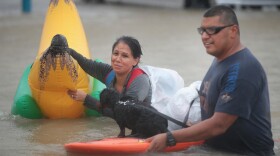
Lauren Silverman
Lauren Silverman is the Health, Science & Technology reporter/blogger at KERA News. She is also the primary backup host for KERA’s Think and the statewide newsmagazine Texas Standard. In 2016, Lauren was recognized as Texas Health Journalist of the Year by the Texas Medical Association. She was part of the Peabody Award-winning team that covered Ebola for NPR in 2014. She also hosted "Surviving Ebola," a special that won Best Long Documentary honors from the Public Radio News Directors Inc. (PRNDI). And she's won a number of regional awards, including an honorable mention for Edward R. Murrow award (for her project “The Broken Hip”), as well as the Texas Veterans Commission’s Excellence in Media Awards in the radio category.
Before joining KERA, Lauren worked at NPR’s weekend All Things Considered in Washington, D.C. There, she produced national stories on everything from the politics of climate change to the future of online education. While at All Things Considered, Lauren also produced a piece on neighborhood farms in Compton, Calif., that won a National Association of Black Journalism’s Salute to Excellence Award.
As a freelance reporter, Lauren has written and recorded stories in English and Spanish for a variety of news outlets, including NPR's Morning Edition, All Things Considered and Here & Now; American Public Media’s Marketplace; Sound Medicine and Latino USA.
-
Breaking up is hard to do, and spy tools are making it even harder. According to family lawyers, scorned spouses are increasingly turning to GPS trackers and cheap spyware apps to watch an ex.
-
The wet wipes industry is blossoming. But with the growth comes a problem: clogged drains. Now the fight over "flushability" is heading to court.
-
Quantity Of 'Skills' Doesn't Mean Quality In Amazon Echo's AlexaAmazon Echo's Alexa has helped people do all sorts of tasks. Although Alexa now has more than 15,000 so-called "skills," critics say that many of Amazon's skills are low-quality.
-
In a new series called "Is My Job Safe?" NPR looks at the future of jobs at a time of rapid gains in artificial intelligence and robotics. We start with a high-paying job in medicine: radiologists.
-
Facebook and Twitter became de facto centers for thousands of stranded people as 911 centers became overwhelmed with calls. Police and officials are using social media as an essential tool to connect.
-
Lots of people forget to take their medicine on time. Now firms are selling "smart" pill bottles that send patients reminders through the Internet. But maybe the real problem isn't forgetfulness.
-
With Internet providers able to track and sell your browsing data, people who want to keep their activity hidden are turning to virtual private networks. But VPNs can themselves be insecure.
-
 More Money, More Problems For AmazonAmazon's remarkable popularity has made it one of the five most valuable companies in the world. But as the power of the Internet juggernaut expands, it also faces a growing number of detractors.
More Money, More Problems For AmazonAmazon's remarkable popularity has made it one of the five most valuable companies in the world. But as the power of the Internet juggernaut expands, it also faces a growing number of detractors. -
Cyberattacks and data breaches are common at health care facilities, and they can put patients' health at risk. Hospitals are behind the curve in beefing up defenses, industry analysts say.
-
Giving people who have serious mental illness peer support has proved so helpful that some states are starting to pay these peer specialists to bridge the gap when there aren't enough professionals.






